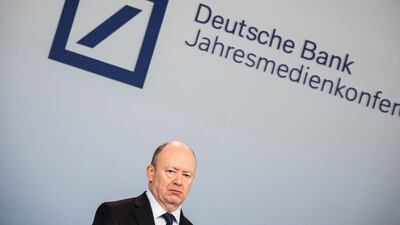Deutsche Bank’s chief investment officer for the lender’s Europe, Middle East and Africa wealth management division Stéphane Junod is telling clients to buy the dips because global growth prospects are still strong despite the wave of equity selling gripping global markets.
“The message we are giving to investors is that these pullbacks could be considered as a buying opportunity,” Mr Junod said.
“We believe that when markets are unsettled investors should focus on fundamentals. Fundamentals suggest that the current market outlook is still good, we still think there is some oxygen left for equities. We don’t see a slowdown in the macro-economic environment and we believe that earnings growth will be solid. We believe the future trajectory is positive.”
So does the International Monetary Fund. Earlier this month the Washington-based lender said the world economy is gaining strength but that structural issues such as weak wage growth and rapid asset appreciation needed to be addressed. In October the IMF said it expected global GDP to advance 3.6 per cent in 2017 and 3.7 per cent in 2018, a 0.1 percentage point increase for both years from previous forecasts.
______
Read More:
US stocks make up for some loss in another roller coaster day
Equity markets in Asia regain some ground
______
Concerns about richly valued equities, which had been gaining ground over the past months, were addressed February 2 when a strong jobs report showed wages were rising at the fastest rate since 2009, prompting fears of accelerating inflation and a quickening of the pace of interest rates this year. Investors were quick to sell and the Dow Jones Industrial Average erased the year's gains February 5, closing down 4.6 per cent, its biggest fall in more than six years. The selloff frenzy eased throughout the week with the market rallying but plunged again on Friday, making it the market’s worst week since January 2016.
Meanwhile, the Vix Volatility index, a gauge of investor fears rose above 50, the highest level since China devalued its currency in August 2015.
"The market needs to start pricing in slowly but surely a transition to less support from central banks in the future," Mr Junod said.
Still, the executive said those fears are overdone as inflation was rising at moderate pace and that inflation in many parts of the world, such as in Europe and Japan, were still below the targets of central banks, suggesting they may not be in a rush to raise interest rates.
Many central banks in many parts of the developing world are lowering interest rates, rather than raising them, which should give these countries a good growth spurt especially as the middle classes continue to grow and consumption is on the rise, said Mr Junod. That's especially true in China, where the economy is shifting from one focused on industry to one more centered on services.
Emerging market equities have also been trading at cheaper valuations than developed market equities. The MSCI Emerging Market Index, a measure of developing market companies, trades at price-to-earnings ratio of 15.44 compared to 18.98 for MSCI All Country World index, a measure of both emerging and developed world markets.
“On emerging markets, we remain constructive because unlike developed countries that are tightening or on the verge of tightening monetary policy, most emerging markets will stay accommodative,” Mr Junod said.

